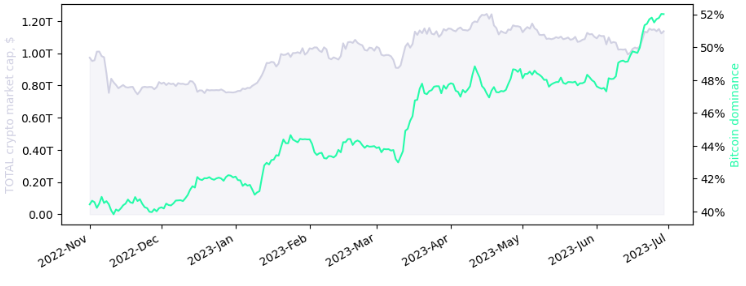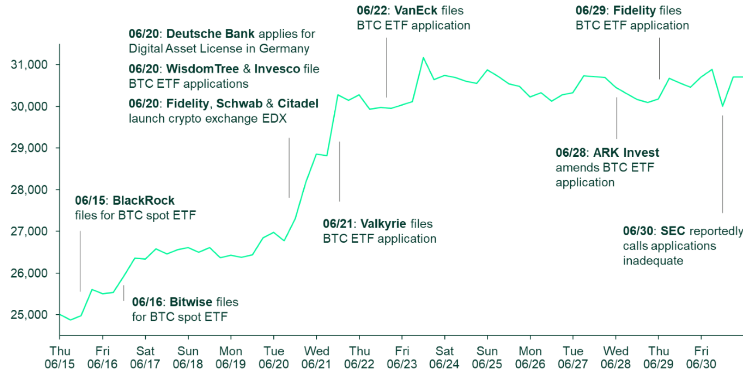Bitstamp Monthly Briefing – June 2023

Each month, we bring you a comprehensive overview of the most significant developments in the world of crypto. From groundbreaking innovations to noteworthy macro events and the performance of crypto assets, we curate all the essential information to keep you up to date, well-informed, and give you a sneak peek at what lies ahead.
Let’s dive in.
Market recap - June 2023
The total crypto market cap increased by 5% MoM and reached $1.16tn at the end of June. Trading volume at leading crypto spot exchanges we track increased by 5% in the same period, surging to $331bn.
BTC dominance increased by 3 pp MoM to 51.2%.
Total crypto market cap (grey) and BTC dominance (green)

Source: Total crypto market cap, Bitcoin dominance
Best performing CMC 100 assets in June
- +168.5% Bitcoin Cash (BCH) - Listed on EDX Markets, a new crypto exchange backed by Charles Schwab, Citadel Securities, and Fidelity Digital Assets.
- +64.6% eCash (XEC) - A rebranded version of Bitcoin Cash ABC (BCHA), a fork of Bitcoin Cash (BCH).
- +55.8% Compound (COMP) - Compound CEO submitted filings for a new company that will create a short-term US government bond fund using the Ethereum blockchain.
Worst performing CMC 100 assets in June
- -29.8% Conflux (CFX) - Fell along with other altcoins early in June; slipped later in month after DWF Labs announced purchase of $18M CFX tokens.
- -29.3% ApeCoin (APE) - Fell along with other altcoins early in June; did not participate in TradFi-driven blue-chip rally later in month.
- -29.3% Sui (SUI) - General bearish trend since May, marked by high sell pressure.
Key macro & crypto events in July 2023
- July 7: US Non-Farm Payrolls
- July 7-8: Crypto Week Madrid Summit
- July 11: Hedera mainnet V0.39 release
- July 15-16: Stable Summit (Paris)
- July 25-26: WebX 2023 (Tokyo)
- July 26: US Fed Interest Rate
- July 27: ECB Interest Rate
Hong Kong embraces crypto with new regulatory framework
In May 2021, Hong Kong issued guidelines that restricted crypto trading to professional investors and required exchanges to obtain licenses, leading to an exodus of crypto companies from the city. However, just two years later, Hong Kong has taken steps towards reclaiming its position as a prominent hub for cryptocurrency companies. Recognizing the importance of providing clear regulations for the crypto industry, Hong Kong introduced a comprehensive new regulatory framework in June that enables licensed virtual asset trading platforms (VATPs) to offer retail crypto trading services.
This regulatory shift in Hong Kong comes amidst a global landscape where many crypto exchanges and service providers are actively seeking out jurisdictions with well-defined regulatory frameworks. In particular, crypto companies based in the United States have expressed frustration with the enforcement approach of the Securities and Exchange Commission (SEC). The recent SEC charges against Binance and Coinbase for allegedly offering unregistered securities highlight these concerns.
Hong Kong's proactive regulatory actions demonstrate its ambition to regain its status as a leading destination for crypto companies. The VATP licensing framework establishes rigorous requirements encompassing consumer protections, market conduct, anti-money laundering (AML) measures, secure asset custody, and more. By prioritizing these safeguards, Hong Kong aims to establish itself as a safe and welcoming jurisdiction for crypto-related activities.
According to reports, the Hong Kong Monetary Authority (HKMA), the city's banking regulator, urged major banks such as HSBC, Standard Chartered, and Bank of China to accept crypto exchanges as clients. This guidance is particularly noteworthy at a time when some banks in other regions have chosen to disassociate themselves or completely cut ties with crypto companies. In contrast, the HKMA emphasized the importance of supporting licensed crypto firms and recognizing their legitimate needs for bank accounts.
In June, a Hong Kong legislator took to Twitter to encourage crypto exchanges to establish their presence in Hong Kong, welcoming them to leverage the benefits of the new regulatory framework. These recent developments highlight the city's desire to create a favorable environment for crypto companies, backed by robust regulations and support from regulatory authorities.
The race for a Bitcoin spot ETF in the US heats up
Bitcoin experienced a price surge in June, reaching $31,000 multiple times during the second half of the month. This upward momentum was triggered by the news of BlackRock's application for a Bitcoin spot ETF with the SEC. The announcement by the $9 trillion asset management giant had a domino effect, leading to a wave of other traditional financial institutions unveiling their own spot ETF products, in addition to various other crypto-related ventures.
Bitcoin price and TradFi announcements

Source: BTC-USD intraday pricing data
A Bitcoin ETF, or Exchange-Traded Fund, is basically a mechanism that enables investing in Bitcoin without storing the keys for a Bitcoin wallet or signing up to a crypto exchange. Unlike the current trust offerings in the market, which rely on futures contracts to track Bitcoin's price, a spot ETF would enable financial institutions to directly buy or sell Bitcoin at the close of each trading day to align the fund's assets with its trading price. This is an attractive prospect for investors as it would provide a more effective means of reflecting the crypto asset's underlying price, as well as allow for redemptions.
BlackRock's application marks at least the 33rd attempt to launch a BTC ETF in the US, as previous applications have consistently faced rejection by the SEC. Firms like Grayscale, Fidelity, Invesco, and Ark Investment have all sought approval for Bitcoin spot ETFs, only to be met with denials over concerns of alleged market manipulation, regulatory gaps, and fraud risks. However, the market's enthusiastic response to the recent announcements suggests renewed optimism for cryptocurrency spot ETF products, largely fueled by BlackRock's innovative product design.
In their application, BlackRock attempted to address the SEC's previous market integrity concerns by including a surveillance-sharing agreement (SSA) between Nasdaq and a crypto spot exchange. Through this agreement, trading activity, clearing activity, and customer identification information will be shared between the exchanges, aiming to mitigate the possibility of market manipulation. Following reports that the SEC still deemed this approach to be inadequate, BlackRock and others have clarified their applications by naming Coinbase as a CEX partner.
Market confidence in BlackRock's application also stems from the firm's impressive track record in securing ETF approvals, boasting a ratio of 575 approvals to 1 rejection. This rate of success showcases BlackRock's proficiency in navigating the complex US regulatory landscape and further bolsters the optimism surrounding the potential approval of their Bitcoin ETF.
Recommended reads
Banks, terribly designed stablecoins by Pantera Capital’s Dan Morehead
Dan Morehead speaks with former SEC Chairman Jay Clayton to discuss the role of banks and blockchain technology. Morehead argues that banks are poorly designed stablecoins, highlighting their leverage and the risks they pose to taxpayers, while Clayton acknowledges the important function banks serve but recognizes the need for liquidity transformation in society. They agree that blockchain technology is the future and can provide transparency and decentralized systems that are not compromised by excessive leverage.
Evaluating blockchain’s mass adoption potential with Jump Crypto
This article dives into the challenges and opportunities of investing in early-stage venture capital and crypto. It introduces a framework called "Pueyo Maps" to assess if blockchain-based solutions are a good fit for different regions. The author discusses the current state of blockchain adoption, with Latin America and Southeast Asia being hotspots, and emphasizes that local factors and market quirks play a big role in adoption.
The June USDT depeg with @brianq
The blog discusses concerns about the recent temporary decoupling of Tether (USDT), the leading stablecoin in the cryptocurrency market. While minor deviations from its $1 value have occurred before, the recent decline to $0.996 has heightened worries. Reports that suggest that Tether's reserves are being scrutinized have led to doubts concerning its financial stability.
The shadow price of venture capital by Nnamdi Iregbulem
The author argues that venture valuations have experienced a significant drop but are still considered too high. The article highlights that valuations have not fallen as much as expected relative to the decline in funding, resulting in valuations that are 60% higher than what would be anticipated based on the amount of capital invested. This discrepancy between valuations and funding suggests a potential correction in the venture capital market, indicating that there may be more challenges ahead.
The convergence of crypto and AI by Kyle Samani and ChatGPT
The blog that was partly written by human and partly by AI explores how the convergence of cryptocurrency and artificial intelligence technologies can offer us new and unique opportunities.
--------------------------------------------------------------------------------------------------------------------------
No information in this blog is intended to provide any personal investment services or advice nor is an investment recommendation. Clients are responsible for making their own investment decisions. Bitstamp accepts no responsibility for any damage and/or loss arising from the use of information provided herein. Past performance is not necessarily an indicator of future results. Please consider your individual position and financial goals before making an independent investment decision.
Bitstamp is licensed to engage in virtual currency business activity by the New York State Department of Financial Services. Licensed as a Money Transmitter by the New York State Department of Financial Services
Not offered in the following states: Hawaii and Nevada
Bitstamp UK Limited is registered with the Financial Conduct Authority under the Money Laundering, Terrorist Financing and Transfer of Funds (Information on the Payer) Regulations 2017.
Don’t invest unless you’re prepared to lose all the money you invest. This is a high risk investment and you’re unlikely to be protected if something goes wrong. Cryptocurrencies are not regulated by the Financial Conduct Authority. Your investment may go down as well as up. You may be required to pay Capital Gains Tax on any profits you earn. You should think carefully about whether dealing in crypto assets is suitable for you in light of your financial situation and risk appetite. For more information on risks inherit to cryptocurrencies please visit: https://www.bitstamp.net/risk-warning/